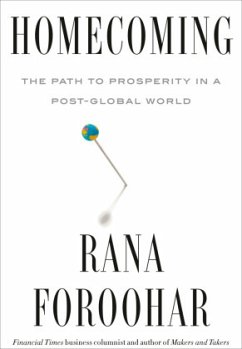A sweeping case that a new age of economic localization will reunite place and prosperity, putting an end to the last half century of globalization by one of the preeminent economic journalists writing today
This invaluable book is as bold in its ambitions as it is readable. Ian Bremmer, New York Times bestselling author of The Power of Crisis
ONE OF THE BEST BOOKS OF THE YEAR: Kirkus Reviews
At the dawn of the twenty-first century, Thomas Friedman, in The World Is Flat, declared globalization the new economic order. But the reign of globalization as we ve known it is over, argues Financial Times columnist and CNN analyst Rana Foroohar, and the rise of local, regional, and homegrown business is now at hand.
With bare supermarket shelves and the shortage of PPE, the pandemic brought the fragility of global trade and supply chains into stark relief. The tragic war in Ukraine and the political and economic chaos that followed have further underlined the vulnerabilities of globalization. The world, it turns out, isn t flat in fact, it s quite bumpy.
This fragmentation has been coming for decades, observes Foroohar. Our neoliberal economic philosophy of prioritizing efficiency over resilience and profits over local prosperity has produced massive inequality, persistent economic insecurity, and distrust in our institutions. This philosophy, which underpinned the last half century of globalization, has run its course. Place-based economics and a wave of technological innovations now make it possible to keep operations, investment, and wealth closer to home, wherever that may be.
With the pendulum of history swinging back, Homecoming explores both the challenges and the possibilities of this new era, and how it can usher in a more equitable and prosperous future.
This invaluable book is as bold in its ambitions as it is readable. Ian Bremmer, New York Times bestselling author of The Power of Crisis
ONE OF THE BEST BOOKS OF THE YEAR: Kirkus Reviews
At the dawn of the twenty-first century, Thomas Friedman, in The World Is Flat, declared globalization the new economic order. But the reign of globalization as we ve known it is over, argues Financial Times columnist and CNN analyst Rana Foroohar, and the rise of local, regional, and homegrown business is now at hand.
With bare supermarket shelves and the shortage of PPE, the pandemic brought the fragility of global trade and supply chains into stark relief. The tragic war in Ukraine and the political and economic chaos that followed have further underlined the vulnerabilities of globalization. The world, it turns out, isn t flat in fact, it s quite bumpy.
This fragmentation has been coming for decades, observes Foroohar. Our neoliberal economic philosophy of prioritizing efficiency over resilience and profits over local prosperity has produced massive inequality, persistent economic insecurity, and distrust in our institutions. This philosophy, which underpinned the last half century of globalization, has run its course. Place-based economics and a wave of technological innovations now make it possible to keep operations, investment, and wealth closer to home, wherever that may be.
With the pendulum of history swinging back, Homecoming explores both the challenges and the possibilities of this new era, and how it can usher in a more equitable and prosperous future.
Fascinating . . . Powerful . . . [A] valuable [contribution] to the understanding of the trends toward regionalization. Foreign Affairs
Foroohar s work here is equal parts journalism and visioning, offering a host of case studies of how we might produce and consume differently while simultaneously painting a picture of a more resilient and rooted economy. . . . As [Homecoming] spells out in vivid detail, we have our work cut out for us to bring the economy home. The American Prospect
In this deeply reported book, Foroohar offers a mix of lively on-the-ground tales and stimulating macroanalysis to explain how globalization and localization are changing business, finance, and our wider society. . . . A must-read. Gillian Tett, New York Times bestselling author of Anthro-Vision
Foroohar has consistently been right on globalization. Homecoming explains how local manufacturing is becoming a solution for many communities around the world. The detailed reporting and interviews make for eye-opening and gripping reading. Joseph E. Stiglitz, Nobel Prize laureate in economics
The way we eat impacts everything in our world, and Homecoming is a thorough examination of not just the dire consequences but also the many hopeful possibilities contained in that simple truth. Alice Waters, New York Times bestselling author of Coming to My Senses
By asking the fundamental questions of what matters and who matters, this book comes with some conditioned optimism about the future: Global cooperation is possible (and needed), but can yield positive social outcomes only if built on sound economic thinking that values community, sustainability, and equity. The road to this new form of capitalism is paved with books like Homecoming. Mariana Mazzucato, author of Mission Economy
In this fascinating book, Rana Foroohar argues that the retreat from hyperglobalization is a fact and a welcome one at that. Homecoming will change how youthink of the world to come. Dani Rodrik, author of The Globalization Paradox
Foroohar walks us through the fiasco of four decades of devotion to neoliberal economic theory that emerged from the collapse of the Bretton Woods system, leading to the inevitable global and internal imbalances we see today. Homecoming offers a truly comprehensive and vivid discussion of the aftermath and what we need to do to belatedly address these errors. Daniel Alpert, author of The Age of Oversupply
Rana Foroohar understands what went wrong with America and how to make it right. In Homecoming she weaves it all together to show how to build a safer, cleaner, and more peaceful world. A visionary blueprint for a future that works for all of us. Barry C. Lynn, author of Liberty from All Masters
Foroohar s work here is equal parts journalism and visioning, offering a host of case studies of how we might produce and consume differently while simultaneously painting a picture of a more resilient and rooted economy. . . . As [Homecoming] spells out in vivid detail, we have our work cut out for us to bring the economy home. The American Prospect
In this deeply reported book, Foroohar offers a mix of lively on-the-ground tales and stimulating macroanalysis to explain how globalization and localization are changing business, finance, and our wider society. . . . A must-read. Gillian Tett, New York Times bestselling author of Anthro-Vision
Foroohar has consistently been right on globalization. Homecoming explains how local manufacturing is becoming a solution for many communities around the world. The detailed reporting and interviews make for eye-opening and gripping reading. Joseph E. Stiglitz, Nobel Prize laureate in economics
The way we eat impacts everything in our world, and Homecoming is a thorough examination of not just the dire consequences but also the many hopeful possibilities contained in that simple truth. Alice Waters, New York Times bestselling author of Coming to My Senses
By asking the fundamental questions of what matters and who matters, this book comes with some conditioned optimism about the future: Global cooperation is possible (and needed), but can yield positive social outcomes only if built on sound economic thinking that values community, sustainability, and equity. The road to this new form of capitalism is paved with books like Homecoming. Mariana Mazzucato, author of Mission Economy
In this fascinating book, Rana Foroohar argues that the retreat from hyperglobalization is a fact and a welcome one at that. Homecoming will change how youthink of the world to come. Dani Rodrik, author of The Globalization Paradox
Foroohar walks us through the fiasco of four decades of devotion to neoliberal economic theory that emerged from the collapse of the Bretton Woods system, leading to the inevitable global and internal imbalances we see today. Homecoming offers a truly comprehensive and vivid discussion of the aftermath and what we need to do to belatedly address these errors. Daniel Alpert, author of The Age of Oversupply
Rana Foroohar understands what went wrong with America and how to make it right. In Homecoming she weaves it all together to show how to build a safer, cleaner, and more peaceful world. A visionary blueprint for a future that works for all of us. Barry C. Lynn, author of Liberty from All Masters








